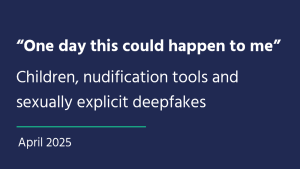Introduction by Dame Rachel de Souza DBE
I began my term as Children’s Commissioner in March this year, shortly before the Everyone’s Invited website went live. Since then, over 50,000 stories have been shared on the website by brave young people, mostly girls, describing their experiences of sexual harassment and abuse – often perpetrated by their peers.
These stories are truly shocking. They show that peer-on-peer abuse is so common that young people simply accept it as part and parcel of daily life. Too often, sexual harassment is not challenged or taken seriously by the adults in children’s lives.
Much of the Everyone’s Invited testimony refers to behaviour taking place in schools (both state and independent). As a former school leader myself, I know that schools certainly need to do more to tackle it, along with their safeguarding partners and the wider education system. I welcomed the opportunity to sit on the reference group to Ofsted’s review of sexual abuse in schools and colleges, in which I pushed for better support for victims of peer-on-peer abuse in schools, along with greater oversight and clarity by Ofsted and Government in relation to this issue.
But this is a complex, deeply-rooted, and ultimately societal problem. It is driven by harmful attitudes about sex, relationships, and gender, often held by adults as well as children. Schools alone cannot stamp out this behaviour – all of us have a role to play.
I am particularly concerned by the fact that much of this sexual harassment and abuse happens online. In some cases, online platforms directly facilitate abuse, such as when nude images are shared on social media or by private message without a young person’s consent. But online channels also contribute to the underlying beliefs and attitudes which drive abuse, most notably through exposing children to inappropriate content, including (but not limited to) pornography, much of which is extreme, violent, and degrading to women. As Children’s Commissioner, I make no judgement about what adults look at in their private lives. But I am concerned by the need to reduce children’s access to content that can cause them harm.
Having shared my concerns with ministers across Government, I welcomed a commission from the Secretaries of State for Education and Digital, Culture, Media and Sports to look into this very issue (see Annex 1). Their letter recognises the Children’s Commissioner’s “unique role in representing the rights, views and interests of children” and asks me to work with them to identify “whether there are actions which we can take now to further protect children before the Online Safety Bill comes into effect.” I was asked to provide specific solutions on the role of parents, carers, and wider family, as well as to ensure the voices of children are heard as the Online Safety Bill undergoes pre-legislative scrutiny.
This report summarises the work my Office has undertaken so far in response to this commission. It sets out my early findings, proposed solutions, and next steps. I am grateful to the support of everyone who has engaged with my team and myself as we
have developed our thinking, including Government, industry, schools, parents, and charities, and I look forward to continuing these conversations as I continue my work.



